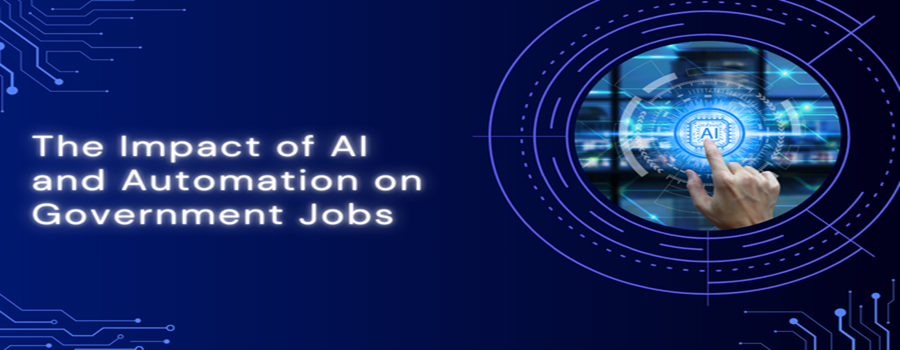The Impact of AI and Automation on Government Jobs: Opportunities and Challenges
The way we live, work and interact with the world is changing, due to artificial intelligence (AI) and automation. These technologies are promising a future of growth and efficiency, but they are also creating questions over what they might do to jobs, particularly in the public sector.
In this blog post, let us go into how AI and automation are transforming government jobs, the issues they bring and the chances they offer to people and the community overall.
How AI and Automation Are Reshaping Government Jobs
AI is being adopted worldwide by governments to help deliver public service, make decisions and do administrative work. Because AI systems can process massive amounts of data, we can arrive at faster, and more accurate solutions. But on the other hand, automation takes over repetitive tasks so that human workers can concentrate on more complex tasks.
For example, chatbots have replaced the customer support and are assisting the citizens in their queries. Government bodies rely on predictive analysis to predict problems such as natural disasters or crime. However, the more machines take on required tasks, the greater the fear of robot job displacement, and particularly amongst certain sections of society.
Opportunities Created by AI in Government Jobs
Although AI will replace some jobs, it is also creating a job for persons in the area of Skill Development and technology management. Institutions are beginning to take on new roles, for example, of AI trainers or of ethical AI overseers. These types of jobs require advanced skills and missions establish initiatives about re-skilling the workforce.
The education system must adapt for those young people who will go into the public sector. Critical to being relevant will be technical subjects and digital literacy. The more integrated AI becomes, the better it is for students to learn how to prepare for future development in the sector.
Challenges Posed by AI in Government Jobs
There are many challenges attached to the adoption of AI and automation. The main issue is about not equal access to resources for the marginalized communities. People from unprivileged families or poor backgrounds could not afford quality education and thus they will remain behind in the new jobs race
Secondly, representation in the AI powered workforce is still an issue. Fair hiring practices must continue and diversity promoted. However, the reservation policy must be in place for some of the groups to balance this problem but it should be taken care to see to it fairness to all classes of people.
Balancing Tradition and Innovation
For young people who are aiming for a sarkari result or rojgar result, the time has changed. Traditional jobs will always have a place but AI and automation is now here to stay. In this environment, those who will do well are those who can blend new technologies and public service.
Rules keep technology growing, but we need to make sure that workers don’t suffer. Moreover, advancements need to be sure not to leave vulnerable groups behind, and governments need to make sure of that.
Opportunities for Aspiring Government Employees
With all the challenges that AI brings, it’s opening up new opportunities for people who are working toward government jobs. For example, guides like How to Choose the Right Government Job Based on Your Qualification or What Are the Highest Paying Government Jobs are for anyone who is looking to get their foot through the door. These are good resources for people to make better choices.
Additionally, new AI-related jobs in the public sector offer exciting career options. When working in AI you are able to solve important problems and improve the public services.
Preparing for an AI-Driven Future
In other words, aspiring candidates must master both traditional and technical skills. But you’ve got to be flexible and make sure you’re open to learning things. In the changing landscape, it means that soft skills like communication and critical thinking will be as important as technical expertise
Take as an example understanding how to efficiently manage tasks like How to Generate Invoice in an automated system is a simple, yet necessary skill. This shows that technology even interferes with the smallest issues of work.
Conclusion
A lot of government jobs are changing because of AI and automation. This brings good opportunities as well as some challenges. We have to put technology to use, but we have to make sure it benefits all. We can build a future where tech and people grow together if we learn new skills, make fair rules and be creative. If AI isn’t changing jobs, it’s at least changing the role of work in society.
Are you ready to change? If you are, then you can grow personally and professionally.
Stay tuned with TheRojgar.com to get the latest updates and tips about this changing world of Government Jobs.
